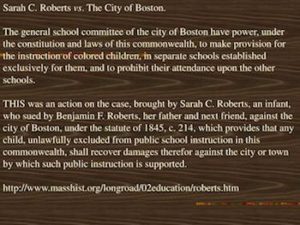
On this date in 1849, the case of Roberts v. The City of Boston began. This lawsuit was on behalf of a Black five-year-old who was barred from school.
The Massachusetts Supreme Court heard the suit and was a prerequisite legal ruling in the American Civil Rights cases of the NAACP’s assault on America’s segregated educational system. The presiding judge was Chief Justice Lemuel Shaw. In 1848, five-year-old Sarah Roberts was barred from the local primary school because she was Black; her father, Benjamin, sued the city. The lawsuit was part of an organized effort by the Black community to end racially segregated schools.
A city ordinance passed in 1845 said any child "unlawfully excluded from the public schools" could recover damages (which meant they could sue the city). Little Sarah had been forced to walk past five other schools to reach the "colored" school in Smith Court. Now, all the child's lawyers had to do was prove that she had been unlawfully barred from those other schools! Benjamin Roberts violated no law when he took his daughter to be enrolled.
School authorities argued that special provisions had been made for "colored" students. Since Boston maintained racially segregated schools, Sarah passed five White schools on her way to the Black schools, and the school board contended it was of no consequence. Roberts retained the talented attorney, abolitionist, and later the United States Senator Charles Sumner. Sumner worked with Robert Morris, a young Black abolitionist and activist lawyer from Boston. This legal team broke new ground in their argument before the court. Invoking "the great principle" embodied in the Constitution of Massachusetts, they asserted that all persons, regardless of race or color, stand as equals before the law.
In April 1850, the Supreme Judicial Court ruled in Roberts v. Boston. Chief Justice Shaw, unmoved by impassioned oratory about freedom and equality, decided the case on narrow legal groups, ruling in favor of the school committee's right to set education policy as it saw fit. Shaw could find no constitutional reason for abolishing Black schools. Boston's schools would remain segregated. The community was stunned.
Historic U.S. Cases, 1690-1993:
An Encyclopedia New York
Copyright 1992 Garland Publishing, New York
ISBN 0-8240-4430-4